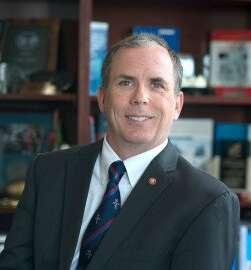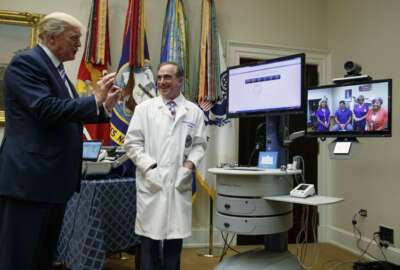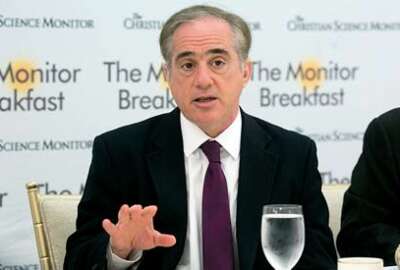
VIDEO: How VA’s longstanding tradition of research makes its mark on veterans, employees
The latest research and advancements from the Veterans Affairs Department include a power-wheelchair that can climb stairs and curbs, new prosthetics and a powerful...
The Veterans Affairs Department prides itself on nearly 100 years of research and medical advancements that benefit those who have borne the battle, but also leave a broader impact.
After all, it was VA doctors and researchers who invented the cardiac pacemaker, developed the nicotine patch, and advanced prosthetics and wheelchair technology.
In 2018, the VA is conducting timely research on opioid use and its impacts, enrolling hundreds of thousands of veterans in a genetic research project and inventing a power wheelchair that can climb stairs and curbs.
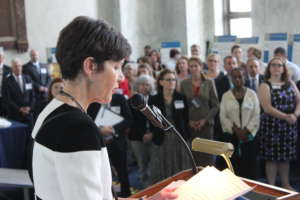
VA doctors and engineers, along with veterans themselves, gave the public and members of Congress a snapshot of this work at the department’s research fair on Capitol Hill in June.
“Research can be a little abstract. It sounds like people in white suits in laboratories,” said Carolyn Clancy, executive in charge of the Veterans Health Administration. “We wanted to be able to show the public and our congressional sponsors, really how this research is helping veterans. It’s really to give them a sense of the real human impact and how it’s changing veterans lives. There are several here today, that it’s impossible not to be moved by how different their lives are.”
One of those veterans is Rory Cooper, the director of the University of Pittsburgh’s Human Engineering Research Laboratories. He showed off the “me-bot,” a power-wheelchair that sits high off the ground and can climb stairs and curbs, at the research fair.
His office has also invented a pneumatically-powered wheelchair that can be completely submersed in water, as well as a computer mouse for veterans who use a prosthetic hook. Cooper won a Service to America Medal for his work developing better wheelchairs, sports equipment and other assistive gear.
Meanwhile office stood up a new technology transfer assistance program to help veterans translate their own ideas for innovations from thought to reality.
Through these types of events and innovation days, Clancy and other top VA leaders have encouraged the agency’s own employees and veterans to recognize problems and inconveniences in their lives and bring forward their own ideas to solve them.
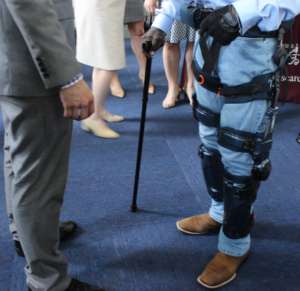
But VA doctors and researchers are also regularly looking for the next big thing they adopt and pilot. Navy veteran Joseph Bailey Jr. is one beneficiary of a few different VA-led pilot projects.
He is testing the Keeogo, robotic exoskeleton developed in Canada which helps him to walk, sit, squat and stand. His doctors at the James J. Peters VA Medical Center in Bronx, New York, suggested he try wearing the device and sent videos of him walking with it back to the VA in Washington.
Bailey said he hopes that with as a test case, VA administrators and the Food and Drug Administration will realize the benefit of the robotic leg and will advocate for its approval in the United States.
“This allows me to have strength,” he said. “It allows me to have endurance, and it’s also something that’s something that’s going to be good for the quality of life for any veteran, and not only veterans, but anyone with the physical disabilities that I also have. [It] will help them later in life, because I have a very full and complete life.”
Bailey is paralyzed on his left side and typically uses a power wheelchair to get around. But during the weekend before the research fair he walked the National Mall in Washington for a few hours with his family using the robotic leg.
“I know it works for me and hopefully with the acceptance of this and support, it will help many others,” he said.
Copyright © 2024 Federal News Network. All rights reserved. This website is not intended for users located within the European Economic Area.
Nicole Ogrysko is a reporter for Federal News Network focusing on the federal workforce and federal pay and benefits.
Follow @nogryskoWFED
Related Stories
